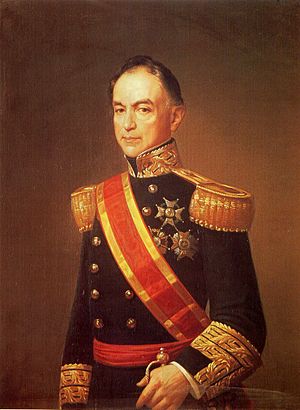Joaquín Ezpeleta Enrile facts for kids
Quick facts for kids
Joaquín Ezpeleta
|
|
|---|---|
 |
|
| 15th President of the Spanish Senate | |
| In office 12 February 1853 – 9 April 1853 |
|
| Monarch | Isabela II |
| Preceded by | The Marquess of Miraflores |
| Succeeded by | The Marquess of Viluma |
| Personal details | |
| Born |
Joaquín Ezpeleta Enrile
September 19, 1788 La Habana, New Spain |
| Died | March 24, 1863 (aged 74) Madrid, Spain |
| Political party | Moderate Party |
| Spouse | María de los Dolores de Contreras y Mencos |
| Occupation | Army officer and politician |
| Awards | Grand Cross of the Order of Isabella the Catholic Laureate Grand Cross of Saint Ferdinand Grand Cross of the Order of Saint Hermenegild |
| Military service | |
| Rank | General |
| Battles/wars | Peninsular War First Carlist War |
Joaquín Ezpeleta Enrile (born September 19, 1788) was an important Spanish politician and army general. He held many significant jobs throughout his life. One of his most important roles was serving as the 15th President of the Spanish Senate. He also worked as a minister, a governor, and a military leader in different parts of Spain and its colonies.
Contents
Biography
Early Life and Military Career
Joaquín Ezpeleta was born on September 19, 1788. His father, José Manuel de Ezpeleta, was a very important person. He served as the Governor-General of Cuba and later as the Viceroy of New Granada. Joaquín's uncle, Pasqual Enrile y Alcedo, was also a high-ranking official, serving as the Governor-General of the Philippines.
In late 1807, Joaquín's father became the Captain-General of Catalonia. Joaquín was with him in Barcelona when French troops attacked the city in 1808. During this time, Joaquín was captured by the French army. He was taken to France as a prisoner. However, he managed to escape and quickly rejoined the Spanish Army. Unfortunately, he was captured again in 1812 and remained imprisoned until the Peninsular War ended.
After the war, Joaquín Ezpeleta returned to Spain. He was promoted to the rank of Colonel. In 1822, he was injured during an uprising by the Royal Guard. This group was trying to bring back an older style of government called absolutism. By 1830, he was promoted again to field marshal and assigned to the Royal Guard. Four years later, he received a special honor called the Grand Cross of the Order of Isabella the Catholic.
Important Roles and Achievements
In 1835, Joaquín Ezpeleta was appointed as the Civil and Military Governor of the Province of Jaén. However, a conflict known as the First Carlist War was growing stronger. Because of this, the Spanish government sent him to the Navarre and Ebro River areas. His job was to lead the government troops there.
Ezpeleta helped another general, Espartero, to free the city of Bilbao. He also helped secure some villages in Burgos and Biscay. He tried to stop the Carlist troops from advancing further. While this strategy didn't fully succeed at first, he achieved his goal in 1836 while helping General Santiago Méndez Vigo. Ezpeleta was injured in this battle and had to leave combat. The next month, he was appointed Viceroy of Navarre and promoted to lieutenant general. This new position allowed him to continue playing a role in the Carlist War.
In 1837, he became the second-in-command to the Captain-General of Cuba. A year later, he was promoted to Captain-General of Cuba himself. He held this important position until 1840, when he resigned due to health reasons. During his time as Captain-General, he did many good things for Cuba. He organized a fire brigade to help fight fires. He also encouraged the creation of savings banks and the building of railway lines. For these important improvements, he was awarded the Laureate Grand Cross of Saint Ferdinand in 1838.
Political Life
Joaquín Ezpeleta had a busy career that combined both military and political roles. He was elected as a Member of Parliament for Navarre in 1834 and again in 1836. Later, in 1845, he became a Life Senator, which meant he would serve in the Senate for the rest of his life.
He also served in the Spanish government as a minister. From January to June 1852, he was the Minister of War. Then, from June to December of the same year, he served as the Minister of the Navy. For a short period, between February and April 1853, he held the very important position of President of the Senate.
Ezpeleta was married to María de los Dolores de Contreras y Mencos. Her father was the Marquess of Lozoya. Joaquín had two brothers, Jose María and Fermin, who were also soldiers and politicians. His sister, María Concepción, married General Pedro Agustín Girón. This means that Joaquín Ezpeleta was the uncle of the 2nd Duke of Ahumada, who founded the Civil Guard, an important police force in Spain.
See also
 In Spanish: Joaquín Ezpeleta Enrile para niños
In Spanish: Joaquín Ezpeleta Enrile para niños
 | Laphonza Butler |
 | Daisy Bates |
 | Elizabeth Piper Ensley |

